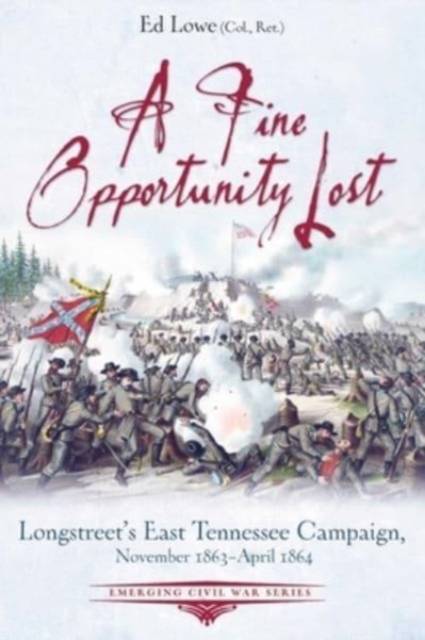
- Afhalen na 1 uur in een winkel met voorraad
- Gratis thuislevering in België vanaf € 30
- Ruim aanbod met 7 miljoen producten
- Afhalen na 1 uur in een winkel met voorraad
- Gratis thuislevering in België vanaf € 30
- Ruim aanbod met 7 miljoen producten
Zoeken
€ 23,95
+ 47 punten
Omschrijving
In Old Warhorse vs. Redemption Seeker, the clash between James Longstreet and Ambrose Burnside unfolds in the Western Theater, shaping the fate of East Tennessee and Chattanooga during the Civil War.
For James Longstreet, the transfer to the Western Theater in 1863 offered opportunity. For his opponent Ambrose Burnside, the hope of redemption.
Longstreet, who Robert E. Lee called his "Old Warhorse," had long labored in the shadow of both his army commander and the late Thomas J. "Stonewall" Jackson. When Confederate fortunes took a turn for the worse in Tennessee, both Jefferson Davis and Robert E. Lee dispatched Longstreet and most of his First Corps to reinforce Braxton Bragg's ill-starred Army of Tennessee. Within hours of his arrival Longstreet helped win the decisive victory at Chickamauga and drove the Union Army of the Cumberland back into Chattanooga. For a host of reasons, some military and some political, Bragg dispatched Longstreet and his troops to East Tennessee.
Waiting for him there was Ambrose Burnside, whose early-war success melted away with his disastrous loss at Fredericksburg in late 1862 at the head of the Army of the Potomac, followed by the humiliation of "The Mud March." Burnside was shuffled to the backwater theater of East Tennessee. Bragg's investment in Chattanooga and subsequent arrival of Longstreet opened the door to Tennessee's Union-leaning eastern counties and imperiled Burnside's isolated force around Knoxville, the region's most important city. A heavy Confederate presence threatened political turmoil for Federal forces and could cut off Burnside's ability to reinforce Chattanooga.
Longstreet finally had the opportunity to display his tactical and operational skills. The two old foes from the Virginia theater found themselves transplanted to unfamiliar ground The fate of East Tennessee, Chattanooga, and the reputations of the respective commanders, hung in the balance.
For James Longstreet, the transfer to the Western Theater in 1863 offered opportunity. For his opponent Ambrose Burnside, the hope of redemption.
Longstreet, who Robert E. Lee called his "Old Warhorse," had long labored in the shadow of both his army commander and the late Thomas J. "Stonewall" Jackson. When Confederate fortunes took a turn for the worse in Tennessee, both Jefferson Davis and Robert E. Lee dispatched Longstreet and most of his First Corps to reinforce Braxton Bragg's ill-starred Army of Tennessee. Within hours of his arrival Longstreet helped win the decisive victory at Chickamauga and drove the Union Army of the Cumberland back into Chattanooga. For a host of reasons, some military and some political, Bragg dispatched Longstreet and his troops to East Tennessee.
Waiting for him there was Ambrose Burnside, whose early-war success melted away with his disastrous loss at Fredericksburg in late 1862 at the head of the Army of the Potomac, followed by the humiliation of "The Mud March." Burnside was shuffled to the backwater theater of East Tennessee. Bragg's investment in Chattanooga and subsequent arrival of Longstreet opened the door to Tennessee's Union-leaning eastern counties and imperiled Burnside's isolated force around Knoxville, the region's most important city. A heavy Confederate presence threatened political turmoil for Federal forces and could cut off Burnside's ability to reinforce Chattanooga.
Longstreet finally had the opportunity to display his tactical and operational skills. The two old foes from the Virginia theater found themselves transplanted to unfamiliar ground The fate of East Tennessee, Chattanooga, and the reputations of the respective commanders, hung in the balance.
Specificaties
Betrokkenen
- Auteur(s):
- Uitgeverij:
Inhoud
- Aantal bladzijden:
- 192
- Taal:
- Engels
- Reeks:
Eigenschappen
- Productcode (EAN):
- 9781611216738
- Verschijningsdatum:
- 15/02/2024
- Uitvoering:
- Paperback
- Formaat:
- Trade paperback (VS)
- Afmetingen:
- 150 mm x 226 mm
- Gewicht:
- 362 g

Alleen bij Standaard Boekhandel
+ 47 punten op je klantenkaart van Standaard Boekhandel
Beoordelingen
We publiceren alleen reviews die voldoen aan de voorwaarden voor reviews. Bekijk onze voorwaarden voor reviews.







